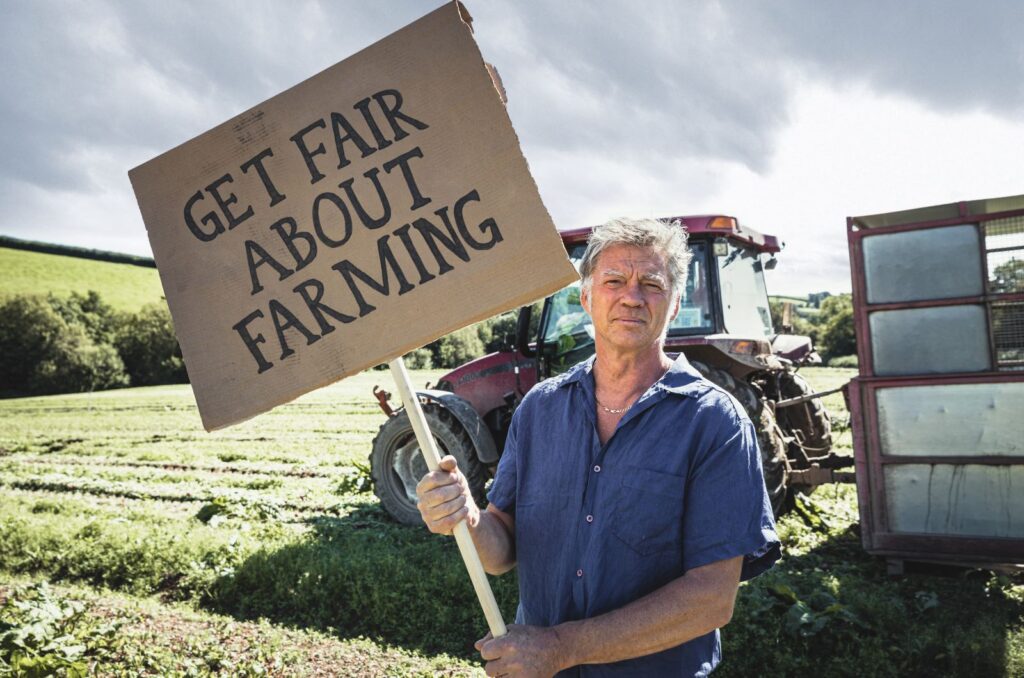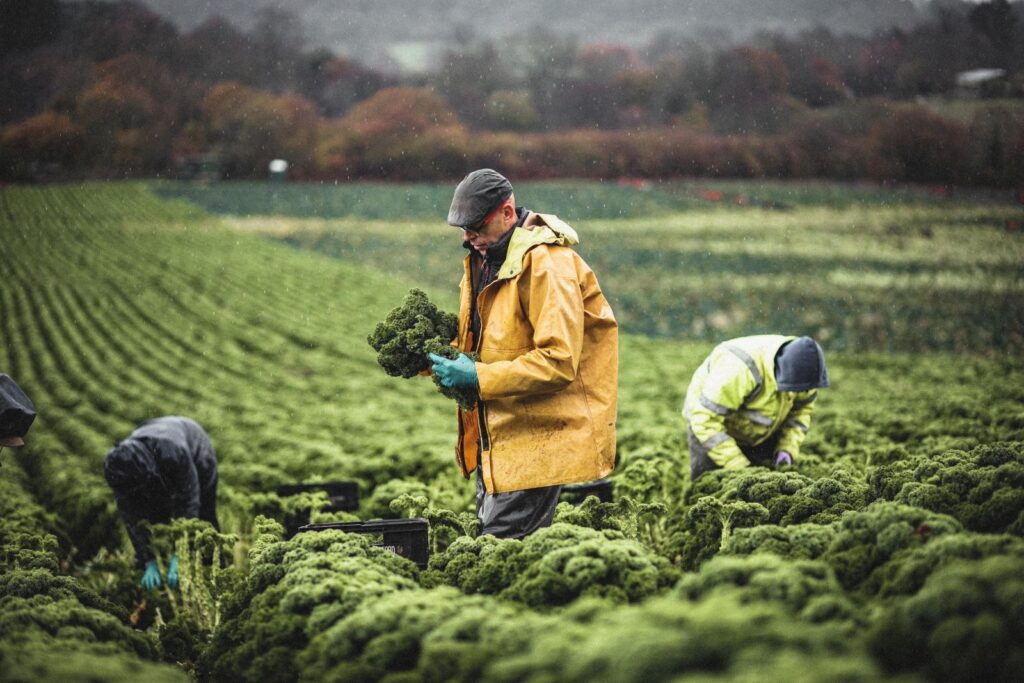UK fruit and veg growers press supermarkets to #GetFairAboutFarming
21st September 2023
A new campaign launched by Riverford Organic Farmers is seeking fair treatment for fruit and vegetable producers, citing that 49% fear closure within the next 12 months as a result of supermarket buying behaviour.

Guy Singh-Watson, founder of Riverford Organic, urged the government and supermarkets to treat farmers fairly.
The campaign is urging the leading ‘Big Six’ supermarkets to adopt fairer principles for farmers and is supported by many notable figures, including Dragon’s Den star Deborah Meaden, chef Rick Stein and wildlife TV presenter Chris Packham.
It comes as almost half (49%) of British fruit and vegetable farmers say it’s likely they will go out of business in the next 12 months, and many blame supermarkets and their buyers as a leading threat to their livelihoods, according to new research by organic veg box company Riverford.
Supermarkets and their buyers are accused of not paying on time, pursuing cheaper food alternatives from overseas, and cancelling or changing orders at the last minute, with farmers also criticising fruit and veg specifications for being too hard and complex.
Three quarters (75%) surveyed say the behaviour of supermarkets is a leading concern within the industry.
According to the research, one in five farmers (22%) say they have suffered a wasted crop due to cancelled orders from supermarkets, 29% have also received a cancelled order with no explanation and just under a third (29%) have seen supermarkets failing to pay them within 30 days.
However, the majority of farmers agreed it would have a positive impact if buyers paid the amount initially agreed, did not then slash prices after the initial agreement, and bought everything they committed to buy.
Guy Singh-Watson, founder of Riverford Organic, said: “British Agriculture is on its knees, and that’s why most small family farms think that they’re not going to be in business in the next generation.
“Is that what we want from our countryside? Is that what we want from our food system? Is that what we want from farmers? Farmers need to be treated fairly; they need some commitment from supermarkets.”
Open letter highlights urgent need for change
As part of the campaign, Riverford wrote an open letter to the CEOs of the ‘Big Six’, highlighting the urgent need for change to save struggling British farms.
The letter has been signed by over 100 leading figures, with supporters including industry bodies like Sustain and The Soil Association, as well as a host of prominent names comprising MPs, business leaders, celebrities and notable farming figures.
Labelling supermarket buying practices as ‘imbalanced, short term and wasteful’, the letter is calling on the ‘Big Six’ to commit to Riverford’s Fair to Farmers charter principles:
- Pay what you agreed to pay.
- Buy what you committed to buy
- Agree on fair specifications
- Commit for the long term
- Pay on time
The charter was devised by founder Guy Singh-Watson to lay down ethical business practices among growers and farmers, to ensure a fair deal is always achieved.
“Sustainable trading relationships are based on co-operation, good communication and trust as much as competition,” he said. “A brutal, short-term focus on annual price negotiations is supporting supermarket margins while destroying British farming along with the landscape, wildlife and rural communities it once supported.
“Given the information, all polls show the British public wants better and would even pay a little more if they knew it went to support better farming.”

While suppermarkets are reporting record profits, hard-working farmers get paid pennies for their produce.
Riverford’s new research also showed farmers are currently being squeezed from all angles, with 67% of fruit and veg farmers agreeing that making a living through farming has never been harder, and 61% worried that they won’t have a farm to pass on to future generations.
Over half of horticultural farmers also believe farming sits on the bottom of the government’s list of priorities, with risks in future government support (28%), alongside crops failing due to weather extremes (29%), being among the top three concerns facing the industry.
Riverford has stressed that current government policies in place to protect farmers from supermarket buying behaviour are inadequate and rarely enforced. Fruit and veg farmers are in agreement, with 69% saying tougher regulations are required to redress the imbalance of power between farmers and the supermarkets and their buyers.
To save Britain’s broken food system from further collapse, Riverford has also launched a petition asking the government to reform the Grocery Supply Code of Practice (GSCP) and ensure farmers are protected from unfair behaviour.
To sign the petition, which gathered over 10,000 signatures within the first day of launching, visit: https://petition.parliament.uk/petitions/643216
“Why are we growing all this food – if we can’t afford to feed ourselves?”

Tessa Elliott and her family grow potatoes for supermarkets on their 500-acre arable farm in Haverfordwest, Pembrokeshire.
Tessa Elliott’s family have farmed 500 acres of arable land in Haverfordwest, Pembrokeshire, for nearly 50 years. She currently grows potatoes for leading supermarkets and previously supplied leeks, all through a third-party supplier.
However, one summer evening led her to question the integrity of a local ‘eco-friendly’ supermarket, upon discovering that all of their potatoes were imports from Egypt or Israel.
After contacting the retailer’s press office, their explanation left her even more baffled, which cited the reason for the choice of potatoes being the intention to supply customers with ‘fresh’ produce.
“I said ‘well they can’t be fresh if they’ve come from Egypt – there are miles of fresh potatoes on your doorstep’.”
Tessa and her brother Patrick work on the farm with their parents Fiona and Ian, who still regularly works extremely long hours at the age of 69, to keep the farm going.
“My dad is nearly 70 years old and doing hours that you wouldn’t even get an 18-year-old doing now and it’s at what cost? Where’s the cut-off point? Farms are going out of business because they can’t afford to grow bigger which is what businesses need to do to survive.”
She knows business can be unfair but asks herself how supermarkets would react if shoppers treated them like stores treat farmers.
“We don’t receive payment from the supermarkets until six weeks after they have sold our produce,” Tessa said. “Consumers don’t go to supermarkets and say they’ll pay for their shopping in six weeks. Supermarkets want the money there and then and there. There’s no ‘buy now pay later’ in a supermarket.
“The problem is that the supermarkets have always got the upper hand, and unfortunately, we need them to sell to, otherwise what are we growing for – they know that. There’s a link in the chain where it’s all gone wrong.”
She said if prices her family currently receives for their produce don’t go up or input costs don’t come down, the farm will have to close its gates for good.
“And it’s scary because then we have to ask ourselves ‘what is it all for then’? Why are we putting in all these hours and doing what we love – ultimately to grow a premium potato to put on people’s plates all year round – if we can’t afford to feed ourselves?”
